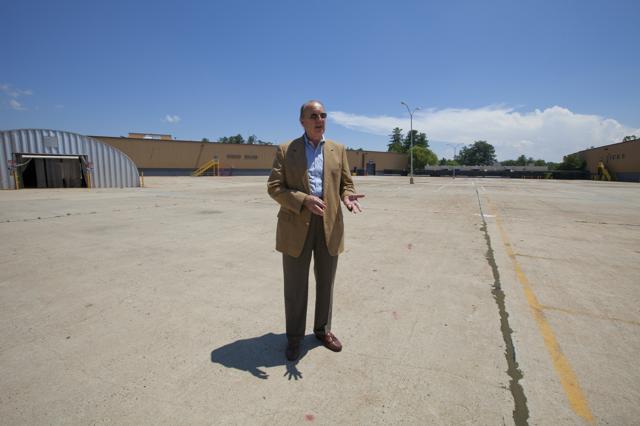After weeks of speculation about a pending deal with an unnamed private company, the Buncombe County Board of Commissioners approved one of the largest real estate purchases in the county's history in hopes of luring new jobs to the area.
The commissioners unanimously agreed to pay $7 million for the former Volvo plant in Skyland, which closed last year. The decision was the only notable action taken during the board’s June 28 meeting (technically, a continuation of the June 21 session).
In the days leading up to the vote, county, city and state leaders had hinted that the purchase would be part of a larger, multifaceted arrangement with a private employer that would then take over the site. During a June 7 closed session, the commissioners discussed offering economic incentives to an unspecified company that "would bring up to 400 jobs and make a $125 million investment in the area," according to the meeting minutes. The day before, Gov. Bev Perdue had flown to Asheville, reportedly to meet with the CEO of an undisclosed large company concerning a possible move to the mountains.
More recently, Asheville City Council member Gordon Smith had tweeted about an upcoming "big jobs announcement.” And a June 27 email from Kit Cramer, president of the Asheville Area Chamber of Commerce, promised that her organization's June 30 meeting "will be the only place to hear BIG NEWS that will have a lasting impact on our community."
Meanwhile, in the hours leading up to the commissioners’ vote, WLOS began reporting that the Canadian-based Linamar Corp., which manufactures engines, transmissions and drive trains, was planning to take over the site (see The Beat, “An Inside Job”).
The commissioners, however, remained tight-lipped, neither confirming nor denying the report. Instead, commissioners and county staff alike touted the purchase in more general terms, saying it was needed to preserve the site for future manufacturing jobs rather than letting it be converted to residential or retail space.
"This board has made it clear time and time again that one of its greatest commitments is to jobs and investment in this community to help get us out of this bad economic climate," asserted County Attorney Michael Frue. "There's been a number of outfits interested in that property. And the last thing we want to see, rather than having manufacturing facilities and a number of good-paying local jobs in the local sector, would be to see it leveled and have a strip mall or apartments built on the site."
Before recommending that the commissioners approve the purchase, Frue also assured them that the county has "undergone an exhaustive due diligence on the property, indicating that it's a good site: It's a good facility, it's good buildings, good grounds." Nonetheless, he cautioned, "Anytime you make a business decision, you take some risk. … There's no certainties in life."
During the public hearing on the matter, local developer Jerry Sternberg helped clarify those potential risks, saying, "If there's an element of speculation in this deal, I think it's a dangerous cliff that you might fall over, because I looked at this property, and it's my best estimate that taxes, maintenance and security, all the other things … could easily run $300,000 to $500,000 a year.
"If the county ended up with this thing by default and had to break it up and start competing with the other empty industrial buildings we have in our community,” he continued, “that would mean those of us who pay taxes are competing with ourselves."
But Sternberg also called the $7 million price tag an "excellent" value for the massive, 65-acre site and 405,108 square foot building. And if the hypothetical business deal came to fruition soon, he added, it could be "the No. 1 achievement" of the commissioners’ term.
The other two people who spoke during the public hearing echoed Sternberg's mix of hopes and concerns.
Candler resident Jerry Rice thanked the commissioners for their "great efforts to bring jobs here," but he also asked for more details, questioning the necessity of using public funds.
"If a company is wealthy enough to operate a system this big, why can't they provide their own money and do it on their own without government assistance?" he wondered. "How many skilled workers are we talking about? How much money do they take home?"
Resident Lisa Landis also pleaded with the commissioners for more information. "Do you have certain businesses that are already looking at this? And why would you be a go-between?” she queried. “I don't understand that. Why would the county commissioners be the middleman?"
No further details were forthcoming, however, and several commissioners told Xpress that they were bound by a confidentiality agreement. Board Chair David Gantt did thank the speakers for their "great questions," though, stressing that any economic incentives the county might offer a private company would require accountability. "It's not just going to be a loosey-goosy process," he assured them.
Commissioner Carol Peterson agreed, explaining, "It's our responsibility to be stewards and try to facilitate economic development in Buncombe County."
— Jake Frankel can be reached at 251-1333, ext. 115, or at jfrankel@mountainx.com.




Before you comment
The comments section is here to provide a platform for civil dialogue on the issues we face together as a local community. Xpress is committed to offering this platform for all voices, but when the tone of the discussion gets nasty or strays off topic, we believe many people choose not to participate. Xpress editors are determined to moderate comments to ensure a constructive interchange is maintained. All comments judged not to be in keeping with the spirit of civil discourse will be removed and repeat violators will be banned. See here for our terms of service. Thank you for being part of this effort to promote respectful discussion.